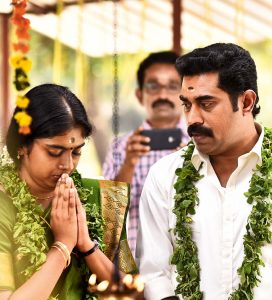I’ve seen some good Malayalam movies this year. I started with the sequel to Drishyam in February, then over the course of the summer I saw Nayattu, Joji, Thondimuthalam Driksakhshiyum, and Kumbalangi Nights.
In watching these films, I felt I was encountering a different sensibility altogether, even though the sentimental themes central to Indian plots, such as family conflicts and romance, were still dominant. A striking feature was the choice of the actors: rather than cast people who look good in the air-brushed, movie-star way — as often happens with the Hrithik Roshans, Aamir Khans and Aishwarya Rais of Bollywood — these movies appear to have chosen actors straight out of the streets and homes, with mannerisms and gestures that are familiar to everyone. The movies also used the natural beauty of Kerala — streams, backwaters, lush green vegetation — to great effect. Indeed, the directors seemed to revel in portraying the sights of Kerala, its urban and rural landscapes, and there wasn’t a single scene in any of these movies that was set outside of the state.
As I learned later, all is this part of what’s called New-Gen Malayalam Cinema. Here’s an excerpt from the Wikipedia page:
“Erosion of the so-called “superstar” system in popular Malayalam films coincided with rise of the new wave where screenplay got rooted-to-reality, closer-to-life and lead characters became ordinary men and women. Influx of new actors, the absence of superstars, rise of metro-centric/urban and middle-class themes and different story-lines were also noted in the wave. While formats and styles of the new directors are deeply influenced by the global and Indian trends, their thematics were firmly rooted in Malayali life and mind-scape.[6] A recurrent trope in these new narratives is accidents, coincidences, casual encounters and chance meetings that set in motion an unexpected chain of events affecting the lives of the characters…”
 The movie I liked the most was Dileesh Pothan’s Thondimuthalam Driksakhshiyum (The Exhibits and the Witness). It is about a newly married inter-caste couple, Sreeja (Nimisha Vijayan) and Prasad (Suraj Venjaramoodu). During a bus journey between towns, Sreeja loses her valuable wedding necklace to a petty wandering thief — incidentally also named Prasad (played by Fahaad Faasil). The thief is caught red-handed in the act but the necklace has disappeared.
The movie I liked the most was Dileesh Pothan’s Thondimuthalam Driksakhshiyum (The Exhibits and the Witness). It is about a newly married inter-caste couple, Sreeja (Nimisha Vijayan) and Prasad (Suraj Venjaramoodu). During a bus journey between towns, Sreeja loses her valuable wedding necklace to a petty wandering thief — incidentally also named Prasad (played by Fahaad Faasil). The thief is caught red-handed in the act but the necklace has disappeared.